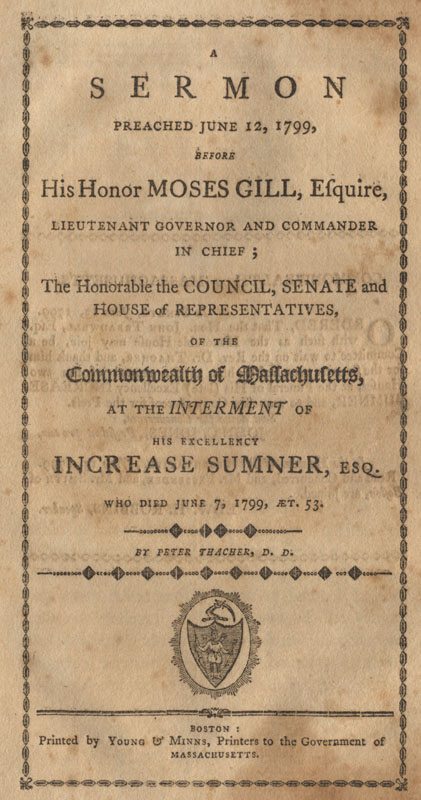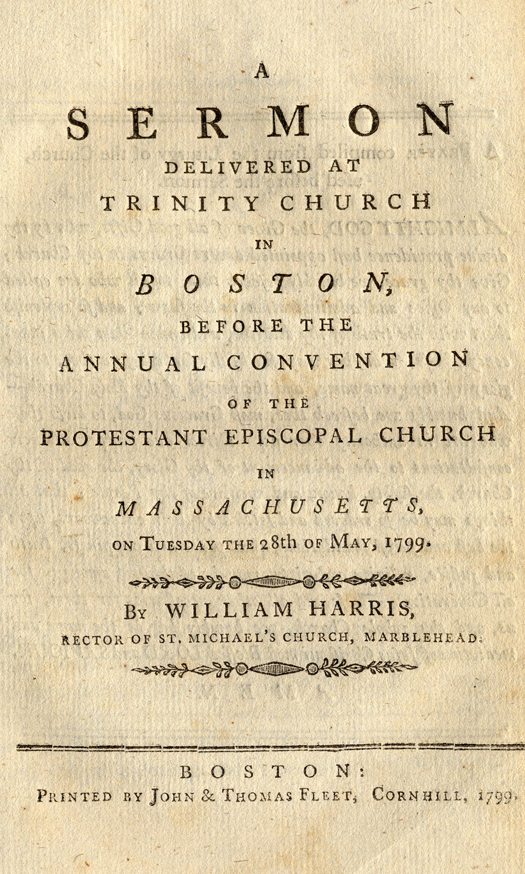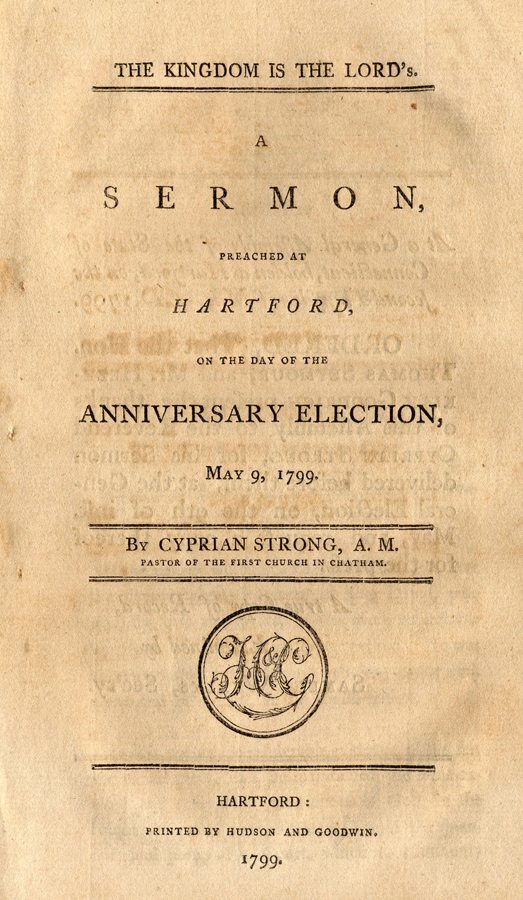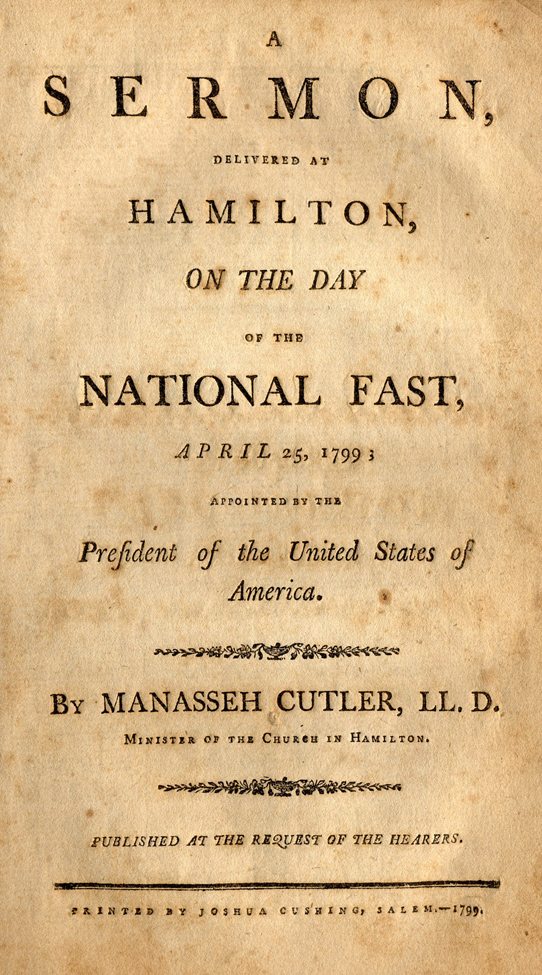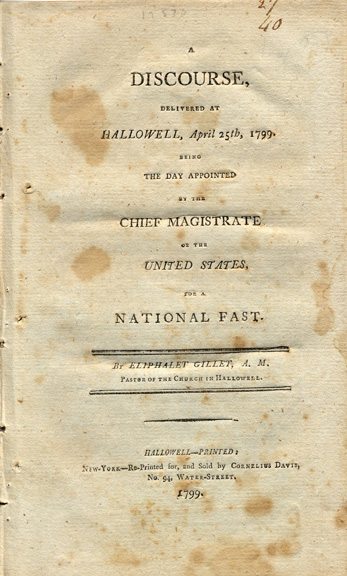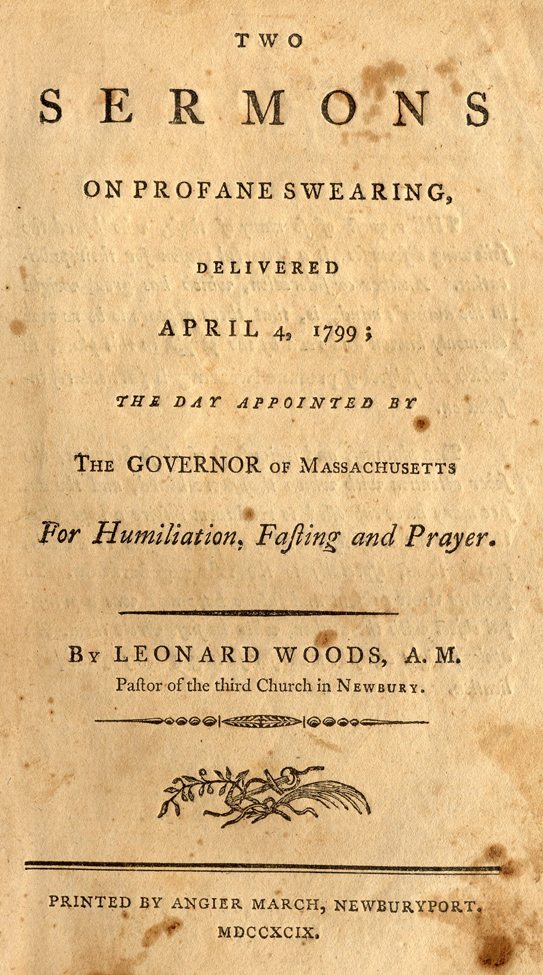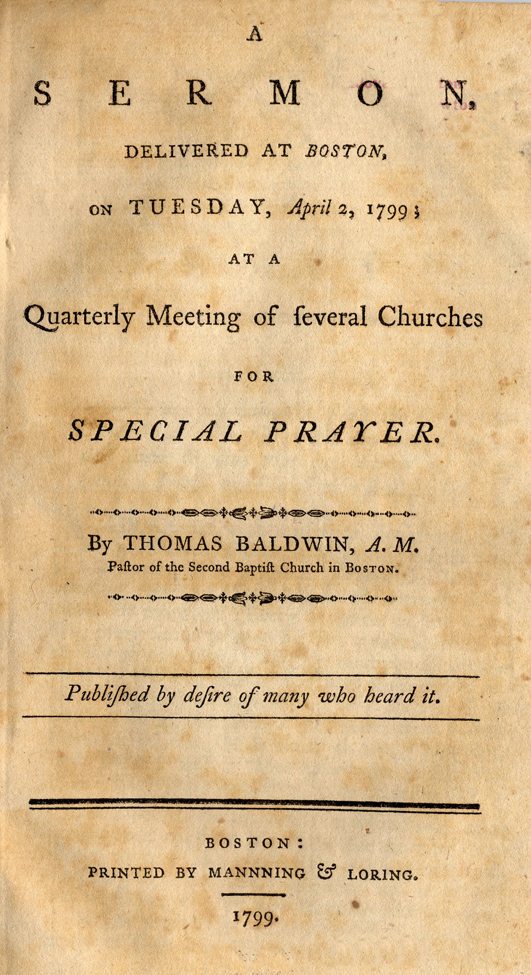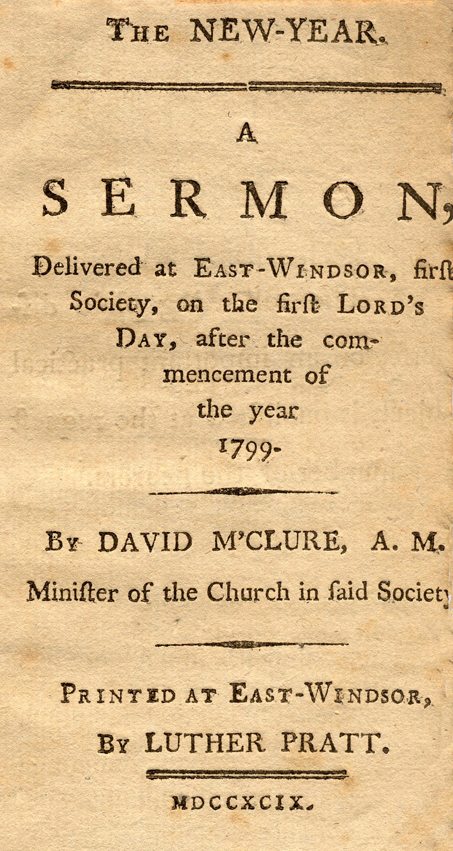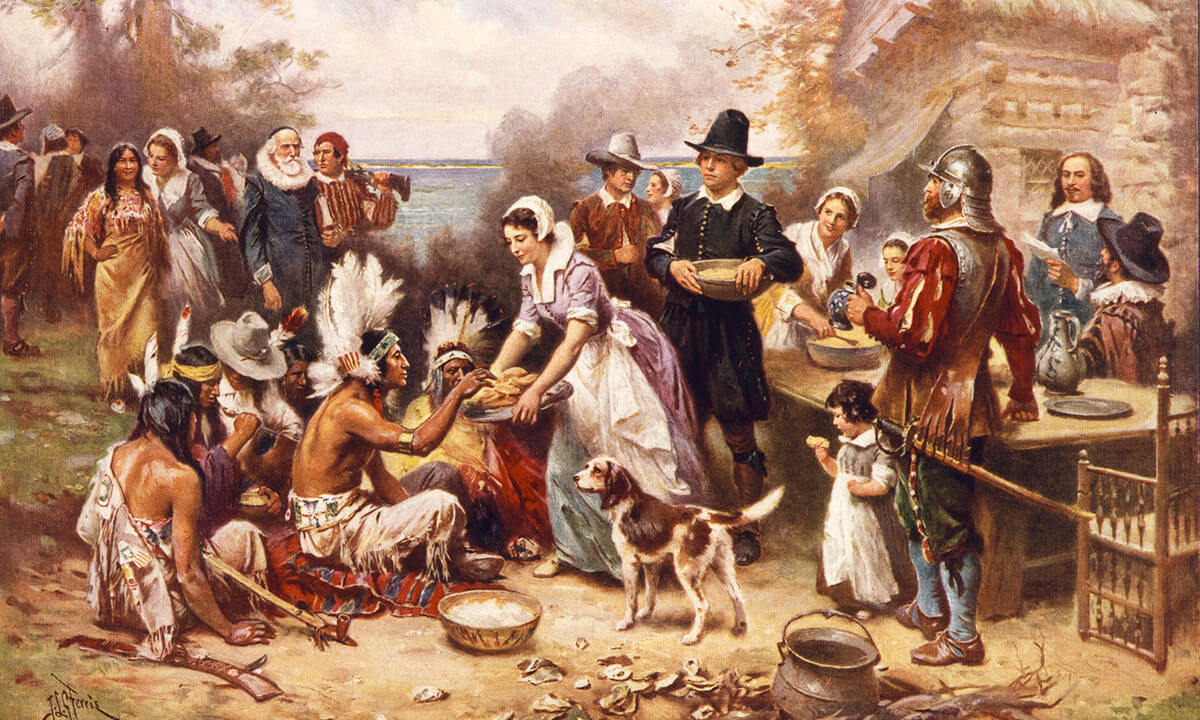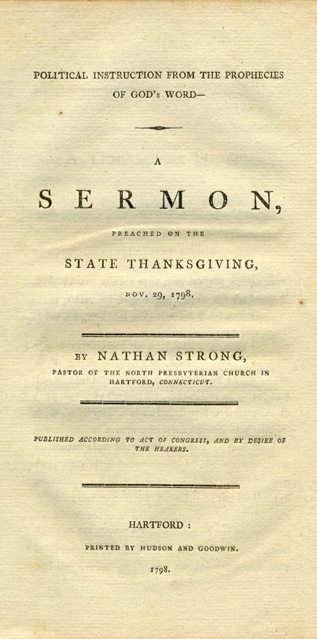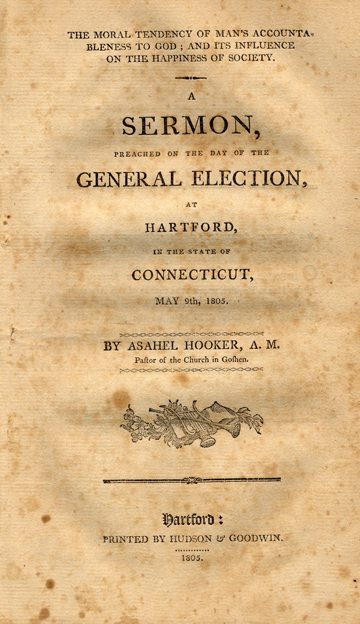
The Moral Tendency of Man’s Accountableness to God; and its Influence on the Happiness of Society.
A
SERMON,
PREACHED ON THE DAY OF THE
GENERAL ELECTION
AT
HARTFORD
IN THE STATE OF
CONNECTICUT,
May 9th, 1805.
BY ASAHEL HOOKER, A.M.
PASTOR OF THE CHURCH IN GOSHEN.
At a General Assembly of the State of Connecticut, holden at Hartford, on the second Thursday of May, A.D. 1805-
Ordered, That the Honorable Aaron Austin and Adino Hale, Esquire, present the thanks of this Assembly to the Reverend ASAHEL HOOKER, for his Sermon preached at the General Election, on the ninth of May instant, and request a copy thereof, that it may be printed.
A true copy of record,
Test,
SAMUEL WYLLYS, SecretaryELECTION SERMONEcclesiastes xii. 14.
For God shall bring every work into judgment, with every secret thing, whether it be good, or whether it be evil.
That there is a God, is demonstrated, by the works of creation and Providence. “The Heavens declare His glory, and the firmament sheweth His handy work.” [Psalm 19:1] Yea, “the invisible things of Him, from the creation of the world, are clearly seen, being understood by the things which are made, even His eternal power and God-head;” [Romans 1:20] so that those, who do not worship and glorify Him, “are without excuse.” [Romans 1:20] But much less is demonstrable, from the light of nature, respecting the ultimate destination of man. In this view, it is even doubtful, whether he shall exit beyond the grave; and of course, whether he shall be called to account, hereafter, or the deeds done in the body. For the needful answer to inquiries of this sort, and others of equal difficulty and importance to men, we are supremely indebted to a revelation from Heaven. By this revelation we are taught, that the resent life is the mere dawn of or existence; that it will be perpetuated, to interminable ages; and be happy or miserable, according to the works performed in its life. We are, therefore, taught in the text, and elsewhere in the same purpose, in the Scriptures of truth, that God shall bring every work into judgment, with every secret thing, whether it be good, or whether it be evil.
This argument is used, by the royal preacher, to enforce the exhortation, in the preceding verse; “Let us hear the conclusion of the whole matter, Fear God, and keep His commandments, for this is the whole duty of man.” [Ecclesiastes 12:13] We are here taught the importance of man’s knowing, and practically acknowledging their accountableness to God, as becometh creatures, whose obligations to Him are infinite, and whose future destiny must be eternally decided, according to their present works. In a view of that awful tribunal, at which all must appear, the wise man admonishes those, “who walk in the way of their own hearts, and in the sight of their own eyes, that for all these things, God will bring them into judgment.” [Ecclesiastes 11:9]
It will be natural, therefore, to attempt such a view of this doctrine, as shall serve to illustrate is moral tendency. From this we may not only judge of its moral agreement with sound reason and the word of God; but may apprehend the true importance of it to mankind; and thence realize the importance of its being believed with all the heart and allowed its full influence in the present state.
It is therefore proposed, I. To notice several things implied in the declaration of the text; and II. To illustrate the moral tendency of it by a view of its practical influence upon men. It is hoped, that the subject will not be found unsuitable to the solemn and momentous occasion, on which we are now assembled.
The first thing of importance, implied in the general doctrine of the text, is, that mankind are subjects of a divine moral government. It is essential to such a government, that laws be enacted, for regulating the hearts and lives of men. It is farther essential, that such laws be sanctioned by divine authority, and enforced by adequate promises and threatenings – promises of due reward to the obedient, and threatenings of just punishment to such as disobey. When God shall bring every work into judgment, there must be some rule, for trying man’s actions, that is may thence appear, whether they ought to be approved, or condemned. Where no law is, there can neither be transgression, nor obedience. Where there is neither promise, nor penalty, there can be not intelligible standard, for deciding, either the good, which would result from obedience, or the evil, which must be the consequence of disobeying. If there were no such standard, the grounds of an equitable decision could not be seen. But as the day of reckoning is ordained of God for revealing His righteous judgments in the impartial distribution of rewards and punishments to men, it is essential, that He should have instituted a government which shall take cognizance of all human actions. Such a government He hath instituted. His laws clearly define and inculcate the whole duty of man. The promise is that the man, who doth the things therein written, shall surely live; but the soul that sinneth it shall die.
But the present administration of the divine government, towards mankind, involves in it a dispensation of mercy. This divine dispensation, as offering infinite blessings, and conferring new and unspeakable obligations upon men is so incorporated with the present operations of God’s moral government as to be fully implied, in the doctrine of a future judgment, as taught by His word. To those who embrace the offers of divine mercy the penalties of disobedience are forever remitted. To such Jesus Christ is the end of the law for justification and life. Those, therefore, who have remained under the law, and consequently under the curse, must endure the penalty annexed to transgression by the law. To this must be super-added the most fearful weight of punishment, which is justly incurred, by condemning the glory of God in the face of Jesus Christ, and thereby rejecting the infinite grace of the Gospel.
When, therefore, God shall bring every work into judgment, all men will receive according to that they have done, in this life. For this purpose, a trial will be instituted, at which the secrets of all hearts will be revealed. Saith the Judge of quick and dead, “I am He that searcheth the heart, and trieth the reins, that I may render to every man, according to his ways, and according to the fruit of his doings.” [Jeremiah 17:10] In the final sentence all will be partakers, according to their respective characters. These will be manifested, to the view of Heaven and earth, by an impartial disclosure of their works.
This momentous trial will therefore issue, in the gracious acquittal of some, and the final condemnation of others. The force of the argument, to fear God and keep His commandments, from the consideration of his bringing every work to judgment, depends on this, not merely that such are acquitted, shall receive a gracious and infinite reward; but, that such as are found guilty, shall inevitably suffer the due punishment of their deeds. If this be thought inconclusive, from the plain impart of the text, it may be put out of question, by a farther appeal to the oracles of God. These assure us, that when the Judge “shall be revealed from heaven, with His mighty angels, in flaming fire,” to complete the redemption of His chosen, “He will take vengeance on those, who have not obeyed the gospel, who shall be punished, with everlasting destruction, from the preference of the Lord, and from the glory of his power.” [2 Thessalonians 1:7-9]
When, therefore, God shall bring every work into judgment, He will vindicate His perfections and ways, against all the hard thoughts and speeches, of His rebellious creatures. Their rejecting the divine Mediator, and with Him, the infinite mercy offered in the Gospel, is the most palpable impeachment of the divine wisdom and benevolence, as displayed in the cross of Jesus. “Behold the Lord cometh with ten thousand of His saints, to execute judgment upon all, and to convince all, who are ungodly among men, of all the hard speeches, which ungodly sinners have spoken against Him.” [Judges 1:14-15] He will then exhibit an awful demonstration, to intelligent beings of all characters, “that righteousness and judgment are the habitation of His throne.” [Psalm 97:2] In taking the needful steps, that He may render to men, according to their works, His own will appear honorable and glorious, from the beginning. In that day, “every mouth will be stopped.” [Romans 3:19] Saints and angels will offer their united tribute of adoration and praise, saying, “Great and marvelous are thy works, Lord God Almighty; just and true are Thy ways, thou King of saints: who shall not fear Thee, O Lord, and give glory to Thy name, for Thy judgments are made manifest.” [Revelation 15:3-4]
The general doctrine of the text accordingly implies the purpose of God, to support His holy government forever. When instituted by the diving Legislator, and Sovereign of the universe, it was doubtless with design, that it should be eternally maintained. It would be madness to admit the possibility that He should recede from His purpose. His law, which is holy, just and good, must be respected. On this depends the eternal happiness of his vast kingdom. If trampled on, the penalty must be executed; unless dispensed with in a way, equally declarative of his indignation against sin, and of His holy purpose, that the law shall be forever magnified and made honorable. And as men reject the gospel, no less than the law, it is essential, the atonement of Christ notwithstanding, that the Most High should still vindicate his government, by punishing the incorrigible despisers of His mercy. His purpose to do this is made known, by the appointment of a day, in which all men shall appear before Him, that they may receive the fruit of their doings. God will hence take effectual measures, to establish His kingdom, and secure its eternal glory and blessedness. Thus the purpose of God, respecting His government, will be displayed, in the eyes of the universe, in a manner, which will command the supreme confidence, adoration, and joy, of all holy minds; but will overwhelm his incorrigible enemies, with everlasting confusion and despair.
II. It is next proposed, to illustrate the moral tendency of this doctrine, by a view of its practical influence upon mankind.
In attempting this, the subject will be first considered, in application to those, who have approving belief of the foregoing sentiments. And how will their hearts and lives be influenced, by such a belief? In proportion to the strength of it, will they no habitually feel, and act, as becometh creatures, who stand accountable to the holy Searcher of hearts, and Judge of the world? Believing this, respecting all their moral actions, and all the motives of them, and glorying in the perfections of God, and displayed in the process, and the issue of the final judgment, will not their treatment of him be respectful, submissive, and holy? Can it fail to be their supreme concern, not through the influence of slavish fear, but “of love, and a sound mind,” [2 Timothy 1:7] to do those things, which are pleasing in his sight? Will they not, therefore, confide implicitly in the wisdom and rectitude of his all-disposing providence, and rest their whole salvation at His mercy, through faith in a Mediator? Of all this there can be no doubt. They will hence acknowledge their dependence on God, as creatures, and as sinners, by “continuing instant in prayer;” [Romans 12:12] and manifest their respect unto all His commandments, by keeping them. In a word, the dominion of holiness being established in their hearts, it will daily operate, to keep them “unspotted in the world,” [James 1:27] and to render them “fruitful, in every good work.”[Colossians 1:10]
It is accordingly certain, that those who embrace the foregoing sentiments, with sincere approbation of them, will demean themselves answerably, towards their fellow men. Their habitual treatment of them will be the genuine expression of integrity, benevolence, and due compassion. Of this they cannot fail, if to a full assent of the understanding to the truth, they unite a supreme complacency, in the character of Judge, and thence approve His purpose, respecting the distribution of rewards and punishments, and His manner of proceeding in it, as predicted in His word. This being true, they will assuredly act, as in the fear of the Lord, in all their intercourse with men. They will “render all their dues;” [Romans 13:7] and in doing this, will regard the divine rule, as infinitely binding; “As ye would, that men should do to you, do ye even so to them, for this is the law and the prophets.” [Matthew 7:12] Such is the moral tendency, and such the unfailing influence of the doctrine asserted in the text, on all, who embrace it with the heart.
We shall next consider this doctrine, in relation to those, who neither believe, nor approve it. It is apparent, that on such, it must be wholly void of influence. Beyond the life which now is, they have nothing to hope, nor to fear, from their present doings. If these, as they presume, shall not be brought into account hereafter, they can neither be rewarded, nor punished. As to any thing, therefore, beyond the present state, they have nothing to hope from well-doing, not any thing to fear from evil-doing. But what must we expect of men, who do not believe in “a judgment to come,” [Revelation 14:7] and a state of eternal retribution? And who, of course, do not feel themselves accountable to “the Judge of the quick, and the dead.” [2 Timothy 4:1] Being confident with their own opinions, all their motives of conduct, whether towards God, or men, must be furnished, exclusively, by the circumstances and interests of the present life. Motives of this sort may doubtless be so presented, as to operate a partial restraint, and produce many apparently good actions; but their influence must be feeble, at best, and always precarious. Can it bear a moment’s comparison, with the influence of those sublime and infinite motives, which are brought home to the heart, in the certain and awful expectation of standing at the tribunal of omniscience, and infinite purity, and of thence receiving and irreversible doom?—Great part of those, who disbelieve their accountability to a sin-hating God, are hence liberated from a sense of moral obligation, and of consequence, indulge in that riotous and unholy living, at which they would be otherwise dismayed. It is accordingly true that vice and irreligion prevail in society, as the natural offspring of a prevailing belief, that “He who sitteth in the heavens,” [Psalm 2:4] will not be strict to “mark iniquity.” [Psalm 130:3] Through individuals, who have been accustomed, by education, to sobriety of manners, may not lose their sober habits, so as to become thorough profligates, at once; still it is demonstrated, by observation and experience, that as a disbelief of the scripture doctrine of retribution prevails among men, it is followed, by a nearly answerable corruption of morals.
Thus the unchangeable tendency of becoming hopeless of good, and fearless of evil, as the final reward of man’s present doings, is clearly illustrated, by a life of practical atheism. In point of moral tendency, there is little to choose, between the creed of the full-grown atheist, and of the deist, who discards the scripture doctrine of accountableness to Jehovah. By deistical writers of the first eminence, the Most High is admitted, rather as an idle spectator, in His own dominions, than as the rightful lawgiver, and Judge of the world, who will reward the righteous, and punish the wicked, without respect to persons. Indeed they deny the evidence of His moral perfections, and righteous government, so as to defeat the best ends of believing, rather than denying “the God who is above.” [Job 31:28]
The love of existence, and of happiness is common to all sensitive and moral beings. Few things, therefore, can be more shocking to a rational mind, than the thought of forever ceasing to exist. But this notwithstanding, such are the imitations of a divine moral government, to which men are accountable, even where the doctrines of revelation are exploded, that those, who are resolved to wallow through life, in the gratification of their lusts, are dismayed, at the thought of a hereafter. They tremble, lest the moment of their exit from this world should bring with it a day of reckoning and an eternity of woe. They are hence driven to seek a respite, from the stings of conscience, and their guilty fears of wrath to come, in the gloomy doctrine of annihilation, and a forlorn hope, that “death will be an eternal sleep.” Established in this refuge of lies, multitudes in this age of madness, called reason, feel themselves emancipated from all restraint, arising from the belief of a God, and a judgment to come. They are accordingly prepared, for a warfare of impiety and lust, against all religion, and sound morality. This is the ultimate tendency of rebelling against the light, and discarding the government of One, who shall bring every work into judgment, and award to men a righteous and eternal retribution. Such is the result of experiment on the modern theory of human “perfectibility;”—an experiment, which is made, “by following nature,” and exploding the religion and morals of the gospel, under the stigmatizing names of prejudice, bigotry, and superstition. Such is the experiment now in operation for translating men out of marvelous light, into Egyptian darkness; yea, for transforming them into beasts, and devils incarnate, and this superceding a judgment to come, by anticipating a hell upon earth. Hence the grievous cry, which is raised against priestcraft, hypocrisy, and delusion – a cry, which is intended to drown the voice on conscience, and, like the savage war-whoop, inspire the assailants, with fresh courage, for invading the throne of God, and of the Lamb. Finally, let the principles of modern infidelity prevail universally, and all the features of fallen human nature would be recognized, as long since exhibited to the life, by the unerring pencil of inspiration: “There is none that understandeth, there is none that seeketh after God. They are all gone out of the way; they are together become unprofitable; there is none that doth good, no not one. Their throat is an open sepulcher; with their tongues they have used deceit, the poison of asps is under their lips; their feet are swift to shed blood; destruction and misery are in their ways, and the way of peace they have not known; there is no fear of God before their eyes.” [Romans 3:11-18]
The moral tendency and importance of the doctrine before us, may be farther illustrated, by an application of it to men, invested is with civil authority. Such of those, as believe themselves accountable to a righteous God, for all their official, as well as private conduct, and unfeignedly approve of being so, will doubtless act accordingly. They will remember, with devout and humble submission, that they are God’s ministers, invested with power and authority, derived from him; and that they are bound, by an immense obligation, to be “nursing fathers” to his church, to the whole community of their fellow-citizens. Legislators, of this character, will endeavor, in framing laws, to harmonize, so far as possible, in the spirit of them, and in all he objects, for which they are enacted, with the perfect laws of heaven. Judges, in like manner, who fear God, and rejoice in being accountable at his bar, will carefully avoid occasion for any to say, “I beheld the place of judgment, and wickedness was there; and the place of righteousness, and iniquity was there.” [Ecclesiastes 3:16] Magistrates of every denomination, feeling themselves responsible to the Sovereign of all worlds, instead of being fearless of Him, or of aiming chiefly to please men, will be able to say with the conscious rectitude of an Apostle, “It is a very small thing, that we should be judged of you, or of man’s judgment; for He who judgeth us, is the Lord.” [1 Corinthians 4:3-4]
But the reverse of all this must be expected of rulers, who regard their authority, as derived exclusively from men, and do not recognize the tribunal of Heaven, as that to which they are amenable, for the faithful discharge of their official trust. Influenced alone by the temporary and interested motives of the present state, what madness to expect, that they should act, as seeing an invisible God; – that as legislators, they should be duly concerned, to frame equal laws; or as judges, to administer justice, without partiality! It is vain, even to hope, that those who “fear not God,” will “regard man” [Luke 18:4] beyond the sordid tastes of private interest. When it is believes, that this can be promoted by the means, there are no motives to restrain them, from the foulest iniquity. They are prepared, both by the spirit which they are of, and by the opinions, which they embrace, to practice on the monstrous theory, that “the end will sanctify the means.” Hence, when it will apparently conduce to their own views of promotion, of continuance in power, and of personal aggrandizement, they will not hesitate, to humor the vilest passions of men, and thus become a praise to evil-doers, but a terror and scourge, to such as do well. All this is not inferred, conclusively, from the preceding view of this subject, but is confirmed by a solemn appeal to facts. It is proved, by similar evidence, that men of this character will betray the same dereliction of all honorable and upright principle, in their official conduct, as in purifying the honors and emoluments of office. Those, therefore, who do not anticipate a reckoning, with a holy God, for their use of authority and power, act in perfect accord with their true characters, when they seek preferment, by the most profound reverence for “the people;”—when they feignedly tender them their most lowly homage, and thus become the cringing sycophants of those, whom they regard, with sovereign contempt.
The practical importance of the doctrine under consideration may be farther seen and felt by a view of its influence on the citizens of a free state, in the choice of its rulers. When called to exercise the invaluable right of suffrage, those who expect to account with God, for every action of their lives, and are pleased with such expectation, will remember the oath of God, by which they have sworn fidelity to public interest. This oath, together with a corresponding frame of heart, will lead them to invest those with civil authority, who, in the judgment of their consciences, agree best to the character of a good ruler, as given by the inspiration of the Almighty. They will, therefore, be most scrupulous, to choose men of wisdom, ability, and integrity, who practically acknowledge the God, who is above. The regard, which they habitually feel for him, as well as for the happiness of the community, will not suffer them to aid, in advancing the unprincipled and immoral, to bear rule, and thus to add the guilt of perjury, to that of treachery and unfaithfulness to the state.
But men, who in their hearts, discard the moral government of God, and take for granted, that He will not render to them their due recompense, at last, will doubtless proceed accordingly, in their choice of men to rule over them. They will naturally prefer rulers of their own stamp. While the licentious opinions and conduct of such rulers are regarded, as a cloak for the fins of others, they will not fail to be commended, as vastly ingenious, liberal, and worthy of imitation. Nor is it the most arduous attainment for human nature, to become so liberal, and enlightened, as to with for rulers, who will practically disclaim the government of the Holy One. When arrived at this, men can easily find arguments to prove, that the rankest infidelity, so far from being injurious, may be of excellent use, in those who are invested, with the highest prerogatives of magistracy. Such men are considered by many, as enjoying the happiest freedom from the influence of superstition, and illiberal prejudices. It can be shown, with wonderful ease, that the are the peculiar “friends of liberty and the rights of conscience;” that as such, they will never interfere in matters of religion; but will guarantee to every man the precious liberty, not only of having no religion, but of contributing to the support of none. Hence the decision of multitudes in favor of men, the most licentious in principle, and the most abandoned in practice, as best qualified, to stand as guardians, to the dearest interests of the community.
We see in this, as one instructive view of the subject, the influence of religion, on the political and social happiness of a nation. “When the righteous are in authority, the people rejoice; but when the wicked bear rule, they mourn.” [Proverbs 29:2] Not, however, that they are pleased, or displeased, according as they have good or bad men to rule over them; but according to this, as a general maxim, they are comparatively happy, or miserable. Virtuous and able rulers are “the ministers of God for good.” [Romans 13:4] They are raised up, and designed for a public blessing. In their love of righteousness, and hatred of iniquity, and in the fullness of their regard to God, and the well being of their fellow men, they will take care to frame such laws as shall guard the rights of individuals and of the state; and make provision that the same shall be faithfully executed. Their personal and official influence will conduce mightily, to the preservation of social order, of pure morality, and of prosperity to the single and undivided interests of the commonwealth. Thus they will be, “as the light of the morning, when the sun ariseth; even as a morning without clouds.” [2 Samuel 23:4] In the hands of such rulers, civil governments is a blessing, which cannot be told. But in those of opposite character, it is often a scourge, even a whip of scorpions. The evils, which may be expected from the government, in the hands of unprincipled men, “who feel power, and forget right,” and who view themselves accountable to none, but those they govern, are more than can be numbered. In framing laws, they will consult the public good no farther is this dictated by a supreme regard to their own. If necessary for compassing this, they will not hesitate at doing it, by “legalizing corruption and iniquity.” The united influence of their examples and authority, will be like that of “Jeroboam, the son of Nebat, who made Israel to sin.” [1 Kings 22:52; 2 Kings 3:3; 2 Kings 10:29; 2 Kings 13:2,11; 2 Kings 14:24; 2 Kings 15:9,18,24, 28; 2 Kings 23:15] Hence the fulfillment of what is written, that “The wicked walk on every side, when the vilest men are exalted.” [Psalm 12:8] When a preference is given of such rulers, to men of sound understanding, of pure morals, and tried integrity, it is the most alarming evidence of the general spread of corruption – that the people have become infatuated, and blind to their true interest – that the anger of God is beginning to smoke against them, and his voice to be heard saying, “Shall I not visit for these things? Shall not my soul be avenged on such a nation as this?” [Jeremiah 5:9,29; Jeremiah 9:9]
Again, when men can say, with approving hearts, “The Lord is out Lawgiver, the Lord is our Judge,” [Isaiah 33:22] they will demean themselves accordingly, as citizens, and subjects of civil government. They will duly respect the laws of society—will “take heed to obey magistrates,” and be subject to men in authority, “not only for wrath, but for conscience’ sake.” [Romans 13:5] They will therefore be ready to every good work – will strengthen the hands of their rulers, and aid them, in the support of government – yea will endeavor, so far as it lieth in them, to discountenance impiety, iniquity, and disorder, in all the forms of them, as offensive to God, and destructive of the well being of man. From the same motives, they will seek the public peace and harmony. To this end, they will keep in sacred remembrance, the exhortation, which is written; “Now I beseech you, brethren, mark them who cause divisions and offences, contrary to doctrine, which ye have learned, and avoid them; for they that are such, serve not out Lord Jesus Christ, but their own belly; and by good words and fair speeches, deceive the hearts of the simple.” [Romans 13:17-18] They will never forget, that “one of the six things, which the Lord hateth, yea one of the seven which are an abomination to him, is sowing disorder among brethren;” [Proverbs 6:16, 19] and, that the man, who foments divisions and animosities, commences an open warfare against the peace of society, and proclaims himself its implacable enemy.
But men, who fear God, and can honestly appeal to him, for the purity of their intentions, will be peace-makers. They will not seek their own interest and exaltation, by exciting a spirit of distrust of public men and measures, when both these are entitled to the public confidence and support. The will not prostitute the liberty of the press, to the cause of licentiousness, and this pervert a primary means of diffusing useful knowledge, and of cementing the bonds of society, that they may undermine its strong foundation, and prostrate its stately pillars in the dust. Nor will they seek great things for themselves, by turning the world upside down, and cover their unhallowed purposes, under a profusion of smooth words, and fair profession of regard to “the rights and liberties of the people.” And let it be remembered, that, whether in posts of honor, or in private stations, they will not attempt to stir up a spirit of bitter envying and strife, among Christians of different denominations, that the religion of Jesus may be disgraced, the foundation of morals be subverted, and the public felicity be sacrificed, to the triumphs of dissolutions and impiety. No, my fellow citizens, men who endure, as feeling Him, who is invisible, will not do such things as these. Nor will men of this character oppose the religion and government of their country, under color of opposing “a union of church and state.” It is true, religion may exist, and even flourish, without the aid of government; for as God is true, “the gates of hell shall not prevail against it.” [Matthew 16:18] But woe to that government, which discards the aid of religion; and woe to that people, who wage war against religion, under pretense of saving it from a destructive alliance with the political interest of their country. Are not the leading opposers of such a union of religion with civil government, as has always existed in this state, fairly suspected of hostility to both, and of being impatient under the restraints of either? Do they reverence and obey the laws of Christ? And are they conscientiously afraid, that the divine beauty of his religion will be marred, by asserting its awful claims on the hearts of rulers, and of ruled; and because it is protected, from persecution and violence, by the laws of society? Are they not those rather, who practically avow their desire, to be “without law to God,” [1 Corinthians 9:21] and to men, and to see a favorite doctrine established, that those have the first claim to the confidence of their fellow men, who show the least regard to God and religion? “But whether it be right, in the sight of God, to hearken to these, more than unto God, judge ye.” [Acts 4:19]
1. On a review of this subject, we may learn how to distinguish between real and pretended patriots. Te regard, which the former of these have, to the happiness of their country, is founded in that love, which is the fulfilling of God’s law; and is cherished by a habitual sense of His presence and glory. It is not only consistent with piety towards God but proceeds from the same source and hence derives its peculiar excellence. Real patriots are those, therefore, whose philanthropy is proved, first of all, by a practical acknowledgement of God, as the supreme good, and the rightful Sovereign of the world. The spirit by which they are actuated appears farther, from their seeking the public happiness, by the proper means – by making themselves examples of piety, benevolence, and well-doing – by endeavoring, in all suitable ways, to support the credibility, and to promote the universal diffusion and influence, of that divine religion, which is full of mercy and good fruits. Such patriots were Moses, Joshua, Samuel, Hezekiah, Josiah, Ezra, Nehemiah, Daniel, and many others recorded in divine history. Such were many of our pious and venerable ancestors, to whom, under God, this state, not only owes her political existence, but a larger share of public and private happiness, than has been almost ever allotted, to a like portion of the human race.
Pretended patriots differ greatly from real ones. They are “heady, high minded, are lovers of pleasures, more than lovers of God.” [2 Timothy 3:4] If “in words they profess to know God, in works they deny him.” [Titus 1:16] They deal largely in professions of disinterested and public spirit. They even seem to have lost sight of all interest of heir own, in the glowing ardor of their concern, for the more important interests of the community. Hence the “good words, and fair speeches,” [Romans 16:18] by which they are signalized, and distinguished from all other men. But their professions, disinterested, and full of benevolence as they seem, are hollow and deceitful, as the source. From which they proceed. “The best of them is a brier, the most upright of them is sharper than a thorn-hedge.” [Micah 7:4] Patriots of the stamp were the renowned Absalom, Ahithophel, and Jereboam the son of Nebat, whose names, covered with the infamy of their deeds, were registered, by the command of heaven, for the admonition of the following ages. Their friendship to mankind was enmity against God and religion, and in league with iniquity, sensuality, and the grossest impiety. Such patriots of our own day, are the perfidious, and the dissolute, with those “scoffers, who walk after their own lusts,” [2 Peter 3:3] and “deny the Lord, who bought them.” [2 Peter 2:1] These, “knowing the judgment of God, that they who commit such things, are worthy of death, not only do the same, but have pleasure in those who do them.” [Romans 1:32] Such, in a word, is the magnitude of their concern, for the public weal, that, for the bare consideration of so much honor, and riches, and dominion, as are at the disposal of their fellow-citizens, “they promise them liberty, but “alas!” are themselves the servants of corruption.” [2 Peter 2:19]
2. We also learn, from the doctrine, which has been considered, he high importance of Christianity, and the happiness of society. For these purposes, the promotion of pure morals would be of vast importance, if death were the end of human existence. But as human nature is, desperately inclined to evil, no scheme can be devised, for keeping the morals of mankind, in any degree pure, without the aid of motives, derived from the belief of a God, and a judgment day. No laws can have force, without penalties. Human laws always prove weak and inefficient unless aided, in some form or other, by religion. Nor will the motives presented, by the most pure system of religion, have the necessary influence, unless aided by the high authority of divine sanctions. No scheme of religion can, however, exist, with laws thus sanctioned, which does not make men accountable to an omniscient Judge, and call to its aid those awful motives, which are drawn from a slate of future rewards and punishments. But aside from the Holy Scriptures, no arguments have been found, to demonstrate the doctrine of a future existence; much less of a judgment day, and an eternal recompense, to the righteous and the wicked. It is true, the religion of the gospel, from the perpetual warfare, which it wages with the selfish interests and passions of men, as always met with the most determined opposition, from a rebellious world. For this reason, its influence on the hearts and lives of men, has hitherto been very partial and limited. But this is no argument against it, as a necessary means of restrain, to mans unholy appetites, and of promoting their present and eternal well-being. Nay, its importance depends on the very reason, why it is hated, and set at naught by many – its arraying the terrors of the Almighty, against their evil deeds. The opposition, which it exhibits to these, is the more formidable, and answerably more offensive, according to the clearness, with which it establishes the throne of God, and makes all men accountable to him. It is this, above all, which renders the religion of Jesus, the abhorrence of those, who fight for the liberty, which is enjoyed, by the wild beasts of the desert. Such are those adepts in wickedness, and the arts of seduction, who roam about, “with eyes full of adultery, and that cannot cease from sin;” [2 Peter 2:14] to whom the sacred vows of marriage are an occasion of sinning, with more greediness and aggravation; “who creep into houses,” [2 Timothy 3:6] in quest of their prey, and regard no destruction of social bands, or of domestic happiness, as an adequate motive, for retraining their unbridled passions. Though prepared to embrace the dregs of pollution, as fuel to their unhallowed flame, they riot, with chief delight, on the spoils of “betrayed innocence.” In a view of their crimes, and of that bitter cup, which now passes over, from their hands, to wretched thousands, we may estimate the flood of woes, which must whelm the abodes of domestic peace and joy, and swallow up millions, in temporal and eternal perdition, should the same pernicious ways be followed, by the great mass of society. The unbounded spread of licentiousness, and the utter destruction of virtuous attachment, and of mutual confidence, between the sexes, would be succeeded, by a parallel diffusion of jealousy, distrust, malignity, envy, and wretchedness. The forlorn offspring of such an extended commerce, in pollution and guilt, would soon people the present habitations of peace, of order, and social happiness, with a race of savages, in whom the virtues and blessings, of all preceding ages, would be lost forever. But the foregoing view of this subject, it appears, that it mankind would universally believe the doctrines, and obey the laws of Christianity, it would purify them from all iniquity, and make them “a peculiar people, zealous of good works.” [Titus 2:14] They would, therefore, be “that happy people, whose God is the Lord.” [Psalm 144:15] “Joy and gladness would be found in their dwellings, thanksgiving and the voice of melody.” [Jeremiah 33:11] Every society of men were present a heaven in miniature, and each family, a “paradise regained.” The unnumbered myriads of the human race, incomparably more happy than ever, since their apostasy, would be meetened [rendered fit] for the inconceivable glories of immortality.
3. The preceding view of this subject naturally suggests the great importance of fidelity to the rising generation. Children are the growing materials, which must soon form the character, and decide on the happiness of society. It is apparent, that this must be happy, or miserable, according to the foundation of these materials. This sentiment accords with the direction, which God gave to Israel, by Moses. Deut. xxxii. 46, 47. “And he said unto them, set your hearts unto all he words, which I testify among you this day, which ye shall command your children to observe, to do all the words of this law. For it is not a vain thing for you, because it is our life; and through this thing shall ye prolong your days, in the land, whither ye go over to Jordan to posses it.” When it is said, “It is not a vain think for you, because it is your life, and through this thing shall ye prolong your days,” it plainly refers to the direction, for teaching the words of God’s law to their children. By this more than by all other means, a foundation would be laid for perpetuating their national existence and transmitting their distinguished privileges to succeeding generations. This shows in what sense we must understand the promise annexed to the fifth commandment, to “honor thy father, and thy mother, that thy days may be long, upon the land, which the Lord thy God giveth thee.” [Exodus 20:12] We must not receive this, as a promise of long life to individuals, as the certain reward of filial obedience; but that God would, in this way, accomplish his gracious purpose, respecting the tribes of Israel, to preserve them a great and happy nation.
The foundation of civil government, no less than that of religion and morals, which are its main pillars, must be laid, in that domestic government, which God has instituted, and that religious education of children, which is solemnly enjoined in his word. If, instead of training up children, “for glory and immortality,” [Romans 2:7] beyond the grave, the primary object were to render them happy, in this life, and by their means, to promote the public happiness, it would be immensely important, that they should be faithfully taught their relation to God, as accountable beings, and all their duties, which belong to them, in this relation. By this means, with the divine blessing, a more perfect state of society might be realized, than has ever existed, since man forsook his Maker. But this depends on the faithfulness of parents, of guardians, and other instructors. When these are not influenced by pious and benevolent motives, nor awed, by that sense of responsibility to God, which religion teaches, they will be negligent, and more than negligent, of the moral and religious education of children. So far from teaching them, that “the fear of the Lord is the fountain of life,” [Proverbs 14:27] and the only sure departure from the snares of death, they will often poison their minds, with the early and deep impression of false opinions, and their whole characters, with the destroying influence of licentious and impious behavior. Such is the alarming fate of many, at the present day, even in our own country. Here many are born and educated, in the school of anarchy, misrule, and irreligion. Of these they will soon be examples, and powerful advocates. Let them sustain a preponderancy of numbers, and of influence, and the feeds of public distress and perplexity will be so widely diffused, and so deeply rooted, as to admit of no remedy. And when this evil, which already assumes a portentous and lowering aspect, has befallen our once happy country, the foundations will be literally destroyed. In that day, nothing better will await us, as a nation, than the dire catastrophe of the house built on he sand; “And the rains descended, and the floods came, and the winds blew, and beat upon the house, and it fell, and great was the fall of it.” [Matthew 7:27]
4. We readily see, in this connection, why the states and empires, which wave risen in past ages, have successively mouldered at the foundation, and eventually tumbled into ruins. They wanted that divine cement, the religion of Jesus, which unites man to man, and men to God. This would have been a living spring of that public and social virtue, and of that piety towards God, without which the most flourishing state must become “like a city, which is broken down, and without walls.” [Proverbs 25:28] When men have no just apprehensions of the Being, “WHOSE KINGDOM RULETH OVER ALL,” and find no motives, for cultivating that “fear of the Lord, which is the beginning of wisdom,” [Psalm 11:10; Psalm 9:10] the fountain of public life and health becomes corrupt, will the whole mass is polluted. The gratification of their lists, unrestrained by the love or fear of the Almighty, gradually engenders effeminacy, weakness, and “unbridled sensuality,” in all classes of people, from the palace to the cottage. By such means, the most flourishing states and kingdoms, recorded in sacred and profane history have fallen no less a prey to themselves and one another than to the overwhelming judgments of a sin-avenging God. But for the fatal cause ere assigned, the illustrious empires of antiquity might, not only have been preserved from desolation and oblivion, but have increased in numbers, in strength, in prosperity, in glory, and in happiness, till this day; yea, have flourished on, “till time shall be no longer.” [Revelation 10:6] But as they did not like even “to retain God in their knowledge,” [Romans 1:28] He gave them up to their own lusts, till they should “eat the fruit of their own ways, and be filled with their own devices.” [Proverbs 1:31] Under this tremendous anathema, the nations of the earth have not only made war, one upon another, but have preyed upon their own blood, and eaten their own flesh, till wasted away, and there was none to deliver.
5. We are further taught, by the light of this subject, the gross mistake of modern philosophers and reformers, who are professedly seeking o promote liberty, and the happiness of man, by exterminating religion, and committing the whole human race, to the guidance of reason, and the light of nature. The liberty thus promoted is mere licentiousness. The war of contending passions and interests, which is enkindled by it, is the deadly bane of rational liberty, and must one day close the reign of anarchy and confusion, with the triumphs of despotic domination. Such is the result of experiment, exhibited by the philosophizing and theoretical reformers, of modern times, in Europe. There is the liberty, which is founded in the prostration of all the principals of piety and social virtue, has had its day, and now as its night. We have there seen the abolition of all religion 1 producing its genuine fruits, an almost universal corruption of morals; with an immensity of the most atrocious crimes, both in public, and in private. We have thus seen the mad theories of atheistical reformers producing a flood of wrongs, unparalleled in the history of nations. We have also seen this same licentious liberty, turning one of the fairest portions of Europe, and of the whole world, into a “golgotha;” and filling its deluded inhabitants, with the very dregs of the cup of tears, of humiliation, and woe. After many millions of people have wallowed in these, through a series of revolutions, in the vain hope of establishing their liberties, we have seen them tamely submitting, to a larger stretch of despotic power, than is endured, by any other nation on earth. Of this sort is the harvest of bitter fruits, which must always be expected to spring up, from that liberty, which is founded in the extirpation of the religion and morals, which are taught by the word of God.
6. We here see also, my fellow-citizens, what we are to expect, as the sure consequences of embracing that vain and impious philosophy, which “changes the truth of God into a lie,” [Romans 1:25] and teaches men, “to worship and serve the creature, more than the CREATOR, WHO IS GOD OVER ALL.” [Romans 1:25] We might expect to see the general triumph of impiety and lust, succeeded by a state of anarchy, frightful as the horrors of chaos. This anarchy would probably be rendered doubly frightful, by the more sullen horrors of a civil war. In the disastrous and bloody train of such a war, (which may heaven prevent,) a despotism would doubtless follow, with iron teeth, to break in pieces and devour; and would erect his throne, on the spot where and the day when, the liberties and glory of America were shrouded together, in one common grave. This fair inheritance, which was purchased by the bold and enterprising spirit, the piety, the prayers, the tears, the sufferings, he invincible fortitude, and even the blood of our pious ancestors, would be despoiled of its essential glory, and become, like mystical Babylon, a habitation of dragons, and a hold of every foul spirit. All this, according exactly with facts, which stare us in the face, is fairly expected, as the most natural consequence of becoming hopeless of future good, and fearless of evil, from he hands of God, as the just rewarder of our doings. To us, therefore, in this land, and even to this state, there is nothing which portends so much evil, or which so palpably threatens our political and eternal destruction, as the prevalence of hose “demoralizing principles,” which are daily insinuated into the vitals of the community. The abettors and friends of those principles, whoever they are, would doubtless glory in seeing he religion from the son of God, prostrated in the dust, his Sabbaths and ordinances abolished, his ministers despoiled, or exiled, and his temples smoking in ruins. Oh my soul, come not thou into their secret, unto their assembly, mine honor, be not thou united”! ! ! [Genesis 49:6]
Those of my audience, who sustain the honorable distinction of Magistrates and Rulers will feel themselves addressed by this subject, not only with the importance of their official duties, but of a practical and sincere acknowledgement of Jehovah, and his righteous government, in a life of holiness and good works. Suffer me to remind you, my honored fellow citizens, that to Him you stand accountable, no less that those, in humbler stations, to whom you are constituted his ministers for good – and that with them you must appear and be judged, at the same divine tribunal, from which there is no appeal. Remember, therefore, what God hath spoken; “He who ruleth over men must be just, ruling in the fear of the Lord:” [2 Samuel 23:3] and that He hath said again; “Him who honoreth me, I will honor; but he that despiseth me, shall be lightly esteemed;” [1 Samuel 2:30] yea, “Whosoever shall be ashamed of me, and of my words, in this adulterous, and sinful generation; of him shall the Son of man be ashamed, when he shall come in he glory of his Father, with the hold angels.” [Luke 9:26]
You, gentlemen, are constituted guardians of the public happiness. For this, let me pray you to watch, “as those who must give account.” [Hebrews 13:17] As one means of inspiring you with due benevolence, fortitude, and perseverance, in attempting this, often contemplate those venerable and excellent rulers, whose examples are recorded for your instruction, imitation, and delight, in the sacred pages. Add to these, and for the same purpose, the long list of worthies, who have gone before you, and been the ornament and praise of this state, no less than the instruments of her stability, glory, and happiness. With the examples of such rulers before you, to aid the influence of those sublime motives, which are exhibited in the word of God, may you “go and do likewise.” [Luke 10:37] It mist be apparent to you all, that religion, as taught be the Divine Word and Spirit, is the corner-stone, and only sure foundation of the individual and social happiness of man. In this view, and aside from that infinite weight of motives, by which it is commended, as giving life unto the soul, of what immeasurable importance is it, to yourselves and fellow-citizens, that you manifest a serious and unequivocal regard to the religion of Emmanuel, and know indeed, that He is the very “Christ of God;” yea, that He is “King of Kings and Lord of Lords.” [Revelation 19:16] Regarding Him as your appointed Judge, and only Savior, and acting from the pure and disinterested motives of His religion, you will have that “wise and understanding heart,” [1 Kings 3:12] which is needful to guide you, in all the duties of your public trust, and the consolations of heaven to support you, under the ponderous weight of public cares. Though your names should be cast out as evil, and though envy should assail you, with her “forked tongue,” you will enjoy the testimony of a good conscience, with the prayers and the confidence of good men, and finally meet the plaudit of an infinite Judge.
From the preceding discourse, the ministers of religion may apprehend the nature, and high importance of the duties incumbent on them. The religion of Jesus, of which we profess to be subjects and ministers, is distinguished from all others, as one which is commended to every man’s conscience, in the sight of God; and as making all men accountable to Him. Preaching this religion, with effect, implies that men are taught their relation to God, as subjects of his moral government, and their obligations to glorify His name – to repent, and believe the Gospel, and to do works meet for repentance. Nor can we hope to promote the political interests of mankind any farther than we are honored, as instruments of advancing the kingdom of righteousness and peace. It is, therefore, the great business of our high calling, as it reflects the honor of God our Savior, and the happiness of our fellow-men, for both worlds, that we be instrumental of their embracing the truth, as it is in Jesus, and of building them up, in faith and holiness, to eternal glory. Important as the whole of this, together with the salvation of our own souls, is the faithful discharge of our duty, as watchmen to theirs. In a view of this numerous and respectable assembly, and of the foregoing sentiments, we are all reminded of that “great and dreadful day,” [Malachi 4:5] where we must meet an assembled universe, “at the judgment-seat of Christ.” [Romans 14:10] In a certain and awful prospect of the account, which we must then render to the Judge of hearts, it becometh us to realize our immense obligations to be holy, and without blame. The God “with whom we have to do,” [Hebrews 4:13] is no respecter of persons. He is “a God of truth, and without iniquity.” [Deuteronomy 32:4] “He will, therefore, render to every man, according to his works.” [Romans 2:6] “To them who seek for glory, honor, and immortality, by patient continuance, in well-doing, he will render eternal life. But to such as are contentious, and do not obey the truth, but obey unrighteousness,” [Romans 2:7-8] He will as surely render “indignation and wrath, tribulation and anguish.” [Romans 2:8-9] In this serious and impressive view of our relation to God, as our rightful Sovereign, and final Judge, may we all be quickened to serve Him and to serve our generation according to His will that when He shall come in His glory, we may be glad, with exceeding joy.
But finally, do any of you, in this assembly, disbelieve the Gospel of Christ, and not expect to be judged, at last, according to your perfect doings? Is your unbelief the result of conviction? And is this conviction the result of a fair and impartial examination of the evidences, by which the divine claims of Christianity are supported? Let us suppose, for once, that yours is “the condemnation, to have loved darkness, rather than light, because your deeds are evil;” [John 3:19] and that hence, you have made lies your refuge. Let us further suppose your mistake to be detected, by the light of eternity, when its consequences must be infinitely too dreadful, to be endured. Shall you, in this fearful extremity, be consoled by the testimony of conscience, that you had decided on the point in question, with all that faithful investigation, that scrupulous care, and that singleness of heart, [Jeremiah 32:39] which all the incomparable weight of the subject demanded! Till this be done, you may well take heed, “lest that come upon you, which is written, behold ye despisers, and wonder and perish;” [Acts 13:40-41] – lest you find to your infinite cost, that “the stone, which the builders rejected, is the come the Head of the corner;” [Psalm 118:22] and that, “on whomsoever it shall fall, it will grind him to powder.” [Matthew 21:44; Luke 20:18]
AMEN.
Endnotes
1. Christianity, as it existed in France, previous to the revolution, retained but few traces of its native simplicity, and divine purity; not can those, who have been praying, for the downfall of the antichrist, consistently rejoice, in his re-establishment, in that country. That temporary abolition of popery, which was attended with such a deluge of tears and blood, is not to be regarded, as the destruction of true religion. But it is well know, by all who have read the history of Europe, for the last twenty years, that the seeds of revolution in France, were sown by men, who had conspired for the universal and indiscriminate destruction of every thing, bearing the name of Christianity. The spirit, therefore, which overturned the existing forms of religion, in France, is no less hostile, and appears, by the exertions which it is making in this, and in other countries, to be no less hostile, to the truth, as it is in Jesus. This is a sufficient ground of that just and universal abhorrence, in which the principals of atheistical reformers are holden, and must always be holden by wise and good men. The influence of these principles, in that rapid and terrible progress of demoralization and wretchedness, which uniformly attends them, clearly demonstrates their horrible tendency. It hence shows what must be their tremendous effects, whenever they become generally prevalent, in society. It is true there is not the remotest danger, that infidelity can destroy the religion and kingdom of Christ. This kingdom, supported by the oath of God, and guarded against its enemies, by the wisdom and strength of omnipotence, will finally break in pieces, and subdue, all opposing kingdoms and interests, and stand forever. But this is no reason, why the friends of religion, and of human happiness, should be indifferent to the spread of those principles, which are everywhere disseminated, with a view of subverting the religion of Jesus. Though his subversion be impossible, as it is impossible, that God should lie, or hat omnipotence should become weak, and unable to accomplish the divine purposes; still it is a truth, which needs no proof, aside from an appeal to facts, that infidelity is more terrible, and more to be avoided, because it is infinitely more hostile to human happiness, than the pestilence, which walketh in darkness. The latter can destroy only the body; but the former, having first infused wormwood and gall into every cup of human enjoyment, must afterwards destroy both soul and body in hell.
